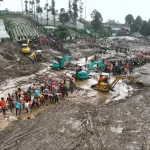If you’re a contractor, you know how expensive heavy equipment can be. A single excavator can cost hundreds of millions to billions of rupiah. But what’s even more costly is the time and money lost when your CPM heavy equipment insurance claim is denied.
Unfortunately, cases like this often occur in the field.
On many projects, contractors feel secure because their heavy equipment is “insured.” But when a disaster strikes, whether an excavator rolls over, a crane falls, or a bulldozer catches fire, their claims are rejected. The reasons vary: “incomplete documents,” “does not meet policy requirements,” “exclusions apply,” and so on.
The problem is, many contractors purchase policies directly from agents or insurance companies without understanding the details of the clauses. When a claim arises, they’re left confused because there’s no one to help them handle it or advocate for their interests with the insurance company.
This is where the role of insurance brokers like L&G Insurance Broker comes in.game changer.
Brokers are not policy selling agents. Brokers work for the insured (contractor), not for the insurance company.
This means that the broker will be the one to assist you from the start: from selecting the right policy, ensuring that the coverage meets your project’s needs, to assisting you in getting your claim disbursed quickly and without any hassle.
So, before you experience a big loss due to a failed claim, let’s first understand the common mistakes contractors often make when CPM heavy equipment insurance claims rejected.
Need a free consultation regarding your CPM heavy equipment insurance claim or want to know the most appropriate policy for your project? Contact our team of experts L&G Insurance Broker on WhatsApp 08118507773 or email to halo@lngrisk.co.id.
We help from the beginning until the claim is disbursed without any consultation fees.
This Is Why Many Heavy Equipment Insurance Claims Are Rejected
1. Choosing the Wrong Policy Type — Insurance Doesn’t Cover All Risks
The most common and fatal mistake is that contractors choose the wrong type of insurance. Many think that simply buying Motor Vehicle Insurance to protect excavators, bulldozers, and dump trucks. But that’s a big mistake.
Heavy project equipment such as excavators, cranes, or rollers cannot be insured with a regular vehicle policy, because:
- Heavy equipment does not have a highway license plate,
- Operating in project areas (off-road), and
- Contains more complex mechanical risks.
What should be used is Contractor’s Plant and Machinery (CPM) Insurance.
This policy is specifically designed for heavy equipment working in project environments, covering risks such as overturning, sinking, burning, being damaged due to accidents, or even being lost due to violent theft.
If the contractor has chosen the wrong policy from the start, automatically any claim cannot be processed, because from a legal and policy provisions perspective, the insurance does not match the insured object.
2. Not Having Strong Evidence When a Loss Occurs
In the claims process, evidence is everything.
Unfortunately, many contractors are not disciplined in this regard. For example:
- There are no photos of the condition of the equipment before and after the accident,
- There was no incident report from the site manager,
- There were no police reports for theft or fire.
Without clear evidence, the insurance company cannot verify whether the incident actually occurred or is in accordance with the policy terms.
For example:
An excavator overturned in a mining area due to a landslide. However, the contractor had no photos of the incident site, no official report, and the equipment was immediately repaired. Ultimately, the claim was rejected due to “no evidence of an accident.”
If you use a broker like L&G Insurance Broker, our team will immediately help guide you through the correct first steps: from documentation and chronological report preparation to communication with the adjuster. This way, you can minimize the chance of your claim being rejected.
3. Not Reporting Claims on Time
Every insurance policy, including CPM, has a claim reporting period, usually a maximum of 7 days from the incident.
Unfortunately, many contractors only report after a week or even a month, when the equipment has been repaired.
For insurance companies, this is a red flag. They can reject claims because they are considered:
- There is no valid evidence,
- Late reporting,
- There were improvements before the survey was conducted.
Insurance brokers like L&G always remind clients to report damage as soon as possible. Even if the chronology is incomplete, an initial report must still be submitted for the claim to be administratively recognized. After that, the paperwork can be completed as needed.
4. Insuring Heavy Equipment Below Its Actual Value (Underinsured)
Many contractors, seeking to save on premiums, insure heavy equipment below its actual market value. For example, an excavator worth Rp 1.5 billion is insured for only Rp 1 billion. While this may seem economical, the consequences can be disastrous when it comes to claims.
Because insurance companies will apply a proportional principle (average clause): if you’re 30% underinsured, your claim will only be paid 70%. So, if your loss is Rp 500 million, you’ll only be paid Rp 350 million.
Brokers play a crucial role in ensuring the insured value matches the market price (replacement value). L&G typically assists clients with the latest heavy equipment market price data, ensuring you don’t misprice your assets.
5. Misperceptions About Police Exemptions
Many contractors only become aware of the “exception” when their claim is rejected.
However, all CPM policies have a standard list of exclusions and these should be understood from the outset.
Some examples of common exceptions inCPM heavy equipment insurance:
- Damage due to normal wear and tear or lack of maintenance,
- Gross negligence of the operator (e.g. drunk or without a license),
- War, riot, or act of terrorism (except purchase of expansion),
- Embezzlement or loss without a trace,
- Damage to minor parts (bolts, glass, lights, etc.).
Brokers like L&G have a duty to explain all clause details in easy-to-understand language, including extended coverage options to ensure your protection truly meets the conditions on the ground.
6. No Supervision of Operators
Many claims fail because the cause turns out to be human error.
For example, the operator is negligent, forgets to turn off the machine, or operates the tool outside the permitted area.
Insurance companies can reject claims if they are deemed to be gross negligence.
In fact, this could have been prevented if the contractor had good SOPs and supported by evidence of operator training.
Some of L&G Insurance Broker’s clients even get help putting together standard safety procedures to support the validity of future claims.
7. Do not involve a broker when purchasing insurance.
This is the core of all the most common problems.
Many contractors think purchasing insurance is sufficient through an agent or directly with the insurance company. However:
- Agents work for the insurance company, not for you.
- Agents only help sell policies, not assist with claims.
- If there is a large claim, you are fighting alone against the legal team and the insurance company’s claims.
Whereas Insurance brokers such as L&G Insurance Broker are the official representatives of the insured (you).
We have permission from OJK and legal obligations to defend client interests.
So, if your claim is rejected or complicated, the broker will step in, not the agent.
L&G even has a special claims and legal support team who helps you formulate arguments, complete documents, and negotiate directly with the insurance company so that your claim can be disbursed quickly.
8. Incomplete Asset Documentation
Many contractors still keep important documents such as purchase invoices, equipment serial numbers, or ownership certificates in a haphazard manner.
When making a claim, this document is requested and if it cannot be proven, the insurance company has the right to refuse.
An insurance broker can help you from the start by preparing all supporting documents, including:
- Photos of heavy equipment from various angles,
- Engine & chassis serial number,
- Proof of purchase or ownership,
- Project location notes,
- Operation logbook.
L&G Insurance Broker even providesCPM standard documentation template to ensure you are ready whenever a risk occurs.
9. Lack of Communication During the Claims Process
After the claim report is submitted, the process still requires intense communication between the contractor, surveyor, adjuster, and insurance company.
The problem is, many contractors are passive and don’t follow up, don’t ask about the status, and ultimately the claim drags on and is even rejected because it’s considered “no follow-up.”
Brokers like L&G act as active liaison between all parties, ensuring that each stage runs smoothly and that no documents are stuck.
This is why customer claims made through brokers tend to be liquid faster compared to those who buy the policy directly.
10. Not Having a Comprehensive Protection Strategy
Some contractors only protect their heavy equipment, but forget that project risks don’t stop there.
For example:
- Project damage (should use CAR Insurance),
- Legal liability towards third parties (TPL Insurance),
- Or long-term job risks.
Brokers like L&G will help put together a total risk management strategy which combines CPM, CAR, and TPL so that your business is truly secure from all sides.
Conclusion
CPM heavy equipment insurance claims were rejected not because of bad luck but because of a lack of understanding and guidance from the start.
Most contractors only realize the importance of a broker after experiencing major losses and having their claims rejected outright.
If you want your project to run safely, your heavy equipment to be protected, and your claims to be paid without drama,Do not buy insurance directly from an agent or insurance company.
Make sure you have officially licensed brokers such as L&G Insurance Broker who always sides with you, not the insurance company.
Consult your protection and claim needs now!
Contact L&G Insurance Broker on WhatsApp 08118507773 or email to halo@lngrisk.co.id for free consultation.
Our team will assist you from the initial policy purchase to the claim disbursement quickly and safely.
With the help of a professional broker like L&G, you not only buy a policy but also guarantee claim certainty when the risk actually occurs.














